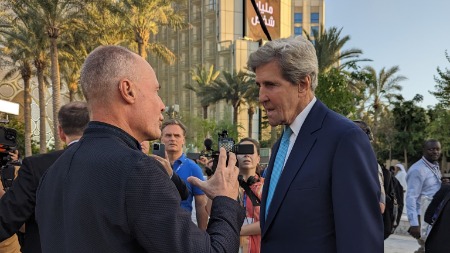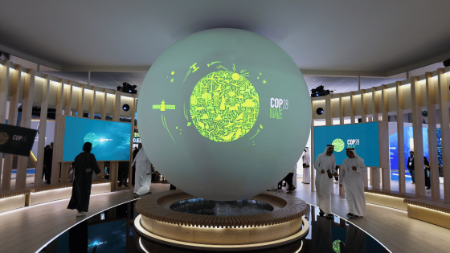Opinion
50 Shades of COP

As a COP participant, I'm confronted daily with the complexity and myriad nuances of the ecological transition, but also surprised by the resulting paradoxes. Here are a few examples.
At first glance, having a major oil producer preside over the climate negotiations seems absurd, since the COP president, Sultan Al Jaber, is considered by some to be a not-so-secret agent of the fossil fuel industry. What's more, nearly a record number of two and a half thousand lobbyists from this sector have been authorized to attend the conference.
Yet it was at this COP that 50 oil and gas companies - representing over 40% of the world's oil production, two-thirds of which are national oil companies - signed a decarbonization charter aimed at aligning themselves with the goal of net zero by 2050. It's arguably slow and unambitious, but it's still the largest number of national oil companies to commit to a decarbonization initiative. Another positive outcome. It's also the first time that oil companies have been directly identified in official documents.
During the opening ceremony, an indigenous Brazilian in traditional dress, adorned with feathers, explained to the world's heads of state that her ancestors had predicted the disappearance of the Sacred Tree. While this kind of COP activity and message may be seen as ineffectual, consider that the head of a 14,000-employee company explained to me that climate was not on his radar until his first COP, when everything changed for him during a meeting with Pakistani activists demonstrating to publicize the catastrophic floods hitting their homeland?
Decarbonisation doesn't always come from where you think. I met the owner of a natural gas company who claims to be doing much better than Tesla in protecting the environment. He tells me: "I avoid 5 million tons of CO2 emissions by selling natural gas to replace coal, whereas Tesla only avoids 4.5 million tons by replacing combustion engines with electric motors.” Greenwashing? Fake? Disruptive truth?
Shall I continue with the paradoxes? We hear that electric mobility has no future if electricity production is dirty. But let's take a closer look. A combustion engine has a maximum efficiency of 27%, so it wastes three quarters of its fuel. A coal-fired power plant with cogeneration of heat and electrons and fitted with a particle filter achieves an efficiency of 80%. If this current is fed into an electric motor, which has an efficiency of over 90%, the result is 72% efficiency - almost 3 times better than the combustion engine. The figures are sometimes surprising.
Let's go a step further. Electric cars are said to be too expensive. Those who suffer from pollution claim they don't want to die because the poor can't afford an electric car. Meanwhile, we hear from those who don't want to die of pollution because the rich have yachts and private jets. Will everyone soon agree on the 15,000-euro Chinese electric cars that are starting to flood the market?
I'd be remiss if I didn't mention the cyclist who rode his bike from Germany to Dubai in 222 days, and who stands with his helmet on in the aisles of the COP. He wants to amplify the criticism aimed at COP participants who come by plane. But at the same time, most of the results achieved here are achieved in impromptu meetings that would be impossible by videoconference. So, what should all those do who don't have the time, or the calves, to pedal for 7 and a half months?
When we say that the energy transition is profitable, we expect that those who adopt it will make more profit than those who maintain the status quo. What about you? If you were offered the chance to earn $50 immediately by doing nothing, or $100 later by committing yourself, which would you choose? Here at the COP, it still looks like many would choose the $50.
The complexity of climate action is clear to see, as is the impasse we get ourselves into with ideologies, assertions, and stereotypes. What is the one element of the recipe that is too often forgotten? The nuance and complementarity of actions.
Opposing ideas, contradictory perspectives and seemingly incompatible forces must coexist if humanity is to meet the existential challenge of climate change. The Chinese have long known this, with their philosophy of Yin and Yang. Are they ahead of us in this respect?
First published by La Tribune, EFFE Verde, La Repubblica and Forum Nachhaltig Wirtschaften.



